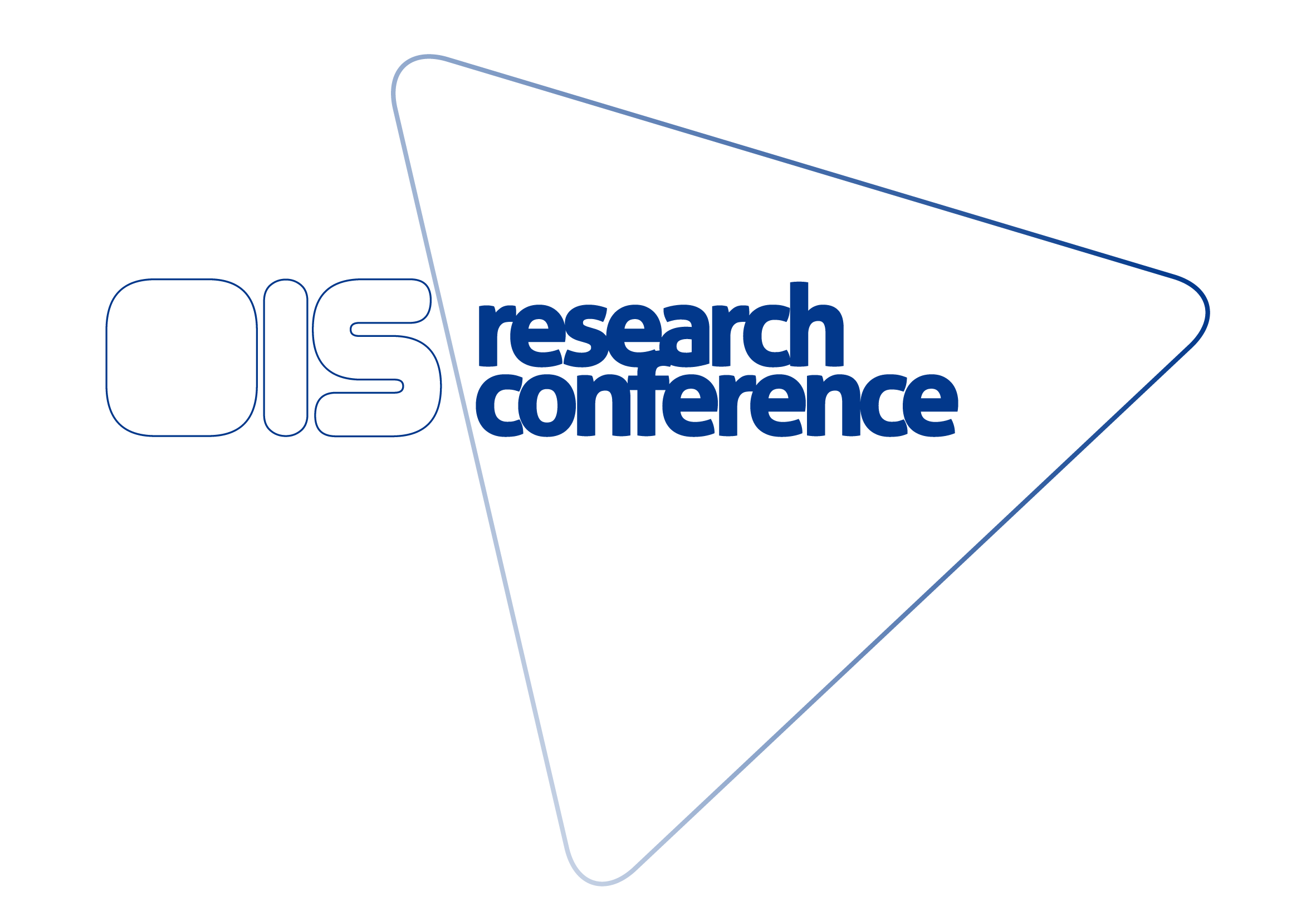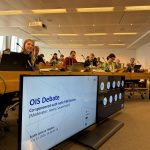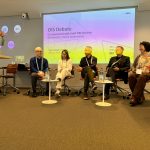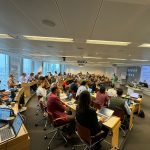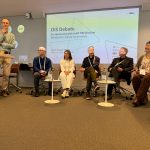Insights from the OIS Research Conference Debate
by Henry Sauermann, 03/06/2024
This year’s OIS debate, co-sponsored by the Technology and Innovation Management (TIM) division of the Academy of Management, was a captivating event that brought together five distinguished panelists from diverse backgrounds: Elaine Chew (King’s College London), Michael Doser (CERN), Markus Perkmann (Imperial College London), Chiara Franzoni (Politecnico di Milano), and Muki Haklay (UCL). The focus of the discussion was on the challenges faced by individual scientists engaged in two specific Open Innovation in Science (OIS) mechanisms: 1) collaborating in interdisciplinary teams and engaging with industry actors, and 2) involving crowds and citizens in research.
At the beginning of the session, the panelists gave short “teaser talks” to get the discussion started. They shared engaging stories about their own journeys using OIS mechanisms, as well as insights from their research on OIS. These talks set the tone for a lively and thought-provoking discussion.
Elaine Chew, a Professor of Engineering at King’s College London, captivated the audience with her work at the intersection of music, engineering, and medicine. Her research explores the therapeutic potential of music through physiological feedback. Despite her prestigious background, including a PhD from MIT, Elaine faced significant challenges in developing her interdisciplinary approach. She emphasized the critical importance of peer support and emotional intelligence, highlighting that navigating interdisciplinary work often requires a supportive network, a keen awareness of the landscape of collaborative research and a strong determination.
Michael Doser, a senior researcher physicist at CERN, shared his journey of integrating interdisciplinary collaboration into his work on antimatter and quantum sensors. Michael’s experience underscored that while securing funding for large, established projects like those at CERN can be relatively straightforward, smaller interdisciplinary projects often struggle for recognition and support. He noted that success in interdisciplinary endeavors can come after establishing a solid foundation in a mainstream discipline, which then provides a platform for broader, cross-disciplinary collaboration.
Markus Perkmann, a Professor of Innovation and Entrepreneurship at Imperial College Business School, delved into the tensions that arise at the interface between academia and industry. He pointed out the delicate balance researchers must maintain between engaging with industry as a signal of ability and impact, versus the potential threat to their academic identity. Markus also shared recent research indicating that performance and recognition are more easily attained by specialized scientists compared to those pursuing interdisciplinary paths, perhaps reflecting a broader systemic bias within academic reward structures.
Chiara Franzoni, a Professor at the Polytechnic University of Milan, brought a unique perspective on crowd and citizen science. She discussed the dual uncertainties scientists face when deciding to pursue new research avenues: uncertainties regarding the likelihood of success and the potential value of the outcomes. Chiara argued that involving affected citizens can provide valuable insights into the perceived value of research outcomes, such as in the case of genetic predisposition testing. She also highlighted the tension between the traditional Mertonian norm of disinterested science and the modern push towards advocacy and politically motivated research, which may be essential to enlist citizens and other stakeholders in research.
Muki Haklay, a Professor of Geographical Information Science at University College London, recounted his long journey toward the acceptance and legitimacy of citizen science. He described the cultural clashes between the citizen science community and the traditional academic control structures. Despite the necessity of citizen science in certain fields, individual scientists often face an „impact penalty“ for the extra work required to document and demonstrate the impact of their research. This burden often benefits institutions more than the individual researchers themselves.
The teaser talks and ensuing panel discussion sparked numerous questions from the audience. Junior scientists sought advice on navigating the complexities of OIS, while others debated the merits and pitfalls of inter- or transdisciplinarity mandates from funding agencies and academic institutions. The conversation also touched on strategies to break the ossification of academic institutions, with discussions on whether change should come from within or be driven by external shocks such as technological advancements or crises like the COVID-19 pandemic.
Looking across various examples and comments, the session highlighted the importance of focusing on the individual level to understand the dynamics involved in effectively applying OIS mechanisms. However, it also emphasized that challenges and opportunities are shaped by broader institutional contexts. The experiences shared by the panelists underscored the need for „institutional entrepreneurship,“ where individuals proactively push boundaries and drive change despite systemic inertia.
In summary, the panel discussion was an inspiring and enriching experience. The complementary perspectives from various fields, coupled with first-hand insights from practice and scholarly research, provided a comprehensive understanding of the opportunities and challenges in OIS. The enthusiastic response from the audience, evidenced by the applause and continued discussions, attested to the session’s impact and relevance, making it a highlight of the conference.
Contact
Please contact us for any questions or to be added to our conference mailing list, which will ensure that you receive the latest updates about the annual OIS Research Conference.
